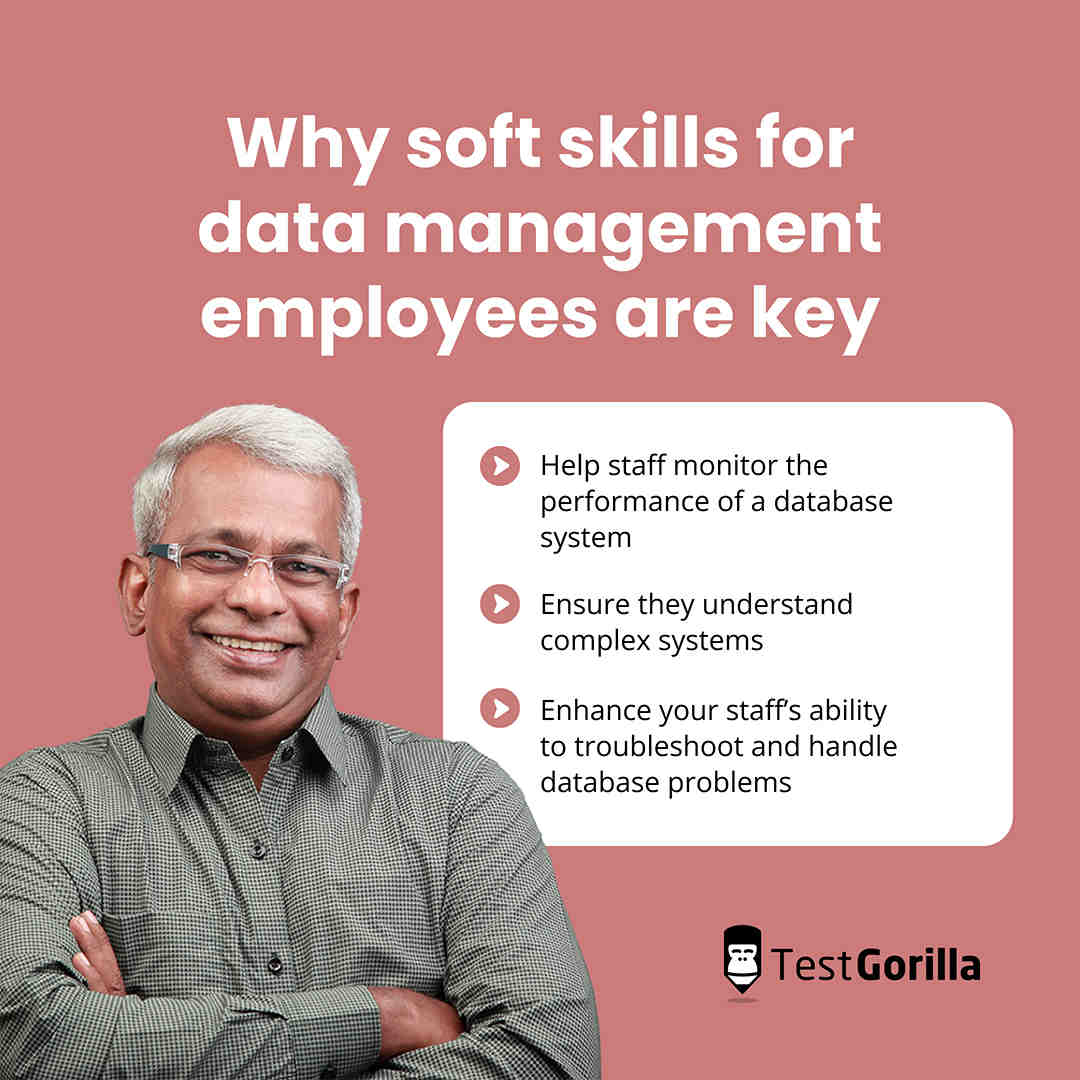Find the right data management skilled employees
The complex process of ingesting, organizing, and maintaining an organization’s data is always best left to expert data management staff, which you might need to hire if you don’t have the appropriately skilled employees. To hire a data management employee, you will need to review your candidates’ data management skills, which you might divide and categorize into data analytics manager skills and soft skills.
Objectively evaluating these skills is the key to hiring excellent candidates who can analyze data and data systems. The outcome is typically a higher guarantee that the data your company collects is accurate and understandable.
How can you test your candidates’ data management skills before you hire a skilled professional? You can use our Data Management and Administration skills test, for one. Consider our tips in this article to begin the candidate review and selection process.
Table of contents
- What is a data management skills assessment?
- Why are data management skills important?
- What skills and traits are important for data management employees?
- Skills and traits tests
- Data management skills assessment – FAQs
- How TestGorilla can help you find the right data management skilled employee
- Start your hiring process with TestGorilla
What is a data management skills assessment?
Evaluating data management skills, such as data warehouse management and database recovery, often requires multiple hiring steps, but you can mitigate these issues with data management skills assessments – a selection of tests that evaluate your candidates’ capability to manage data.
Data management skills assessments ensure candidates can supply data to applications, an essential step for end users to consume the data. The tests also provide an objective and bias-free hiring method by offering percentages to measure candidate knowledge.
Some of the other specific skills that data management skills assessments can help you evaluate include database performance management, which is important for managing complex software and web applications, and database design, essential for accessing accurate and up-to-date information.
There are more skills that you can evaluate with these assessments, including:
Change management for an integrated data collection process
Data availability to ensure your organization’s business-related data is available
Database recovery for mitigating data loss
Data integrity to ensure the data is accurate and consistent
Data management skills assessments have several advantages for hiring managers and recruiters, helping them to review candidates after candidate sourcing without spending too much time on resume screening.
They can replace the resume screening process by providing an alternative recruitment method that reduces time-to-hire metrics and ensures smooth onboarding. They also enable you to spot skills gaps and create plans to support the skills development of your new employees.
For example, if you find that a quantitative analyst does not understand database recovery techniques such as shadow paging, rollbacks, or replication, you can use the Database Management and Administration test results to determine which specific sub-skills they lack.
After learning about their skills gaps, you can create training programs, such as courses, mentorship, practical work, or modules to fill those gaps.
Why are data management skills important?
The data market is poised to reach $273.4bn by 2026 due to the sharp increase in data volume for many companies. To navigate this increase, you require candidates with data management skills, such as database software management and data integrity skills. This outcome is one reason these skills are important, but here are some extra reasons they are fundamental.
Data manager skills work with customer relationship management
Data manager skills, such as database software management, planning and design, and data analysis, all have practical applications for real case scenarios. For example, with database planning and design skills, your candidates can create and assess data in customer relationship management (CRM) tools to monitor and store customer data and enhance customer satisfaction based on the data.
The main outcome of CRM usage with data manager skills includes increased sales and profits, enhanced customer retention, and better knowledge of customers to build customer-company relationships. The findings of case studies such as AAXIS indicate that selecting the ideal CRM optimized their marketing automation processes and helped them save $250,000 just by switching to a different option, and data manager skills were key for this.
Alternatively, if creating an e-commerce website, candidates might require database planning and design to guarantee the system can handle a significant amount of data by designing a schema.
Data analytics manager skills are ideal for marketing and decision making
Data analytics manager skills are also fundamental because they ensure candidates can use data-driven insights to make better decisions for customers and their company. Data analysis sub-skills, such as collecting, cleaning, and using computational methods to analyze data have real-world applications such as completing marketing campaigns or financial analysis.
For marketing campaigns, candidates might assess performance and success with computational methods, and for financial analysis, candidates might look for trends or anomalies to enhance the financial performance of a business.
Another case study from Sperry and Hutchinson Co. supports this, showing how data manager skills enhanced their campaign results. It ensured they could provide data access to a central database – the data of which encouraged retailers to remain with their company and enhanced retention.
Clinical data manager skills help with innovation and company growth
Businesses can also benefit if the candidates they hire have data manager skills like data analysis because they contribute to increased innovation and potentially new growth. For example, businesses can optimize their supply chain and mitigate and manage risk by assessing current trends and collecting data for supply chain management projects.
In other examples, skills such as efficient data storage can provide innovative ways to enhance data security. Therefore, if candidates can manage data effectively, they will ensure that unauthorized sources do not access or modify the data, providing better protection. The result of these skills include:
Enhanced customer trust with your business
Reduced data breach risk
Better regulatory compliance
The best insights on HR and recruitment, delivered to your inbox.
Biweekly updates. No spam. Unsubscribe any time.
What skills and traits are important for data management employees?
For multiple reasons, technical data management skills such as analysis, traits such as conscientiousness, and soft skills such as communication are equally important for data management employees. Consider the following factors to explore why they are fundamental:
Soft skills for data management employees are key
Multiple traits and skills, such as problem solving, analytical ability, and attention to detail, are fundamental for data management employees since they:
Help staff monitor the performance of a database system
Ensure they understand complex systems
Enhance your staff’s ability to troubleshoot and handle database problems
These sub-skills also feature in the important qualities list of data management employees from the US Bureau of Labor Statistics, which mentions that analytical skills involve evaluating information from multiple sources, and attention to detail can ensure candidates understand discrepancies between data. Since this skill mitigates minor database-related errors, finding a detail-oriented candidate is fundamental.
In real case examples, attention to detail and analytical skills for data management can mean the difference between accurate data reconciliation from multiple sources and inaccurate data entry that doesn’t reflect the organization’s financial position for financial projects. It can also mean the difference between improving customer satisfaction with CRM projects and tracking customer interactions incorrectly due to inaccurate data entry.
It is well worth finding candidates with excellent problem-solving abilities to avoid these errors. Problem-solving skills in data management are crucial because they ensure candidates can identify and resolve issues that might negatively affect the quality of the data or compromise data security.
For example, to handle security issues in data security projects, candidates must identify the system’s vulnerabilities and develop security measures to resolve them.
Looking to hire a data entry supervisor? Check out our data entry supervisor test and top interview questions for data entry supervisors.
Specific traits are essential for data managers
A data manager can help your organization succeed with its data management duties if they have traits such as conscientiousness and adaptability.
Adaptability is important because once a candidate has evaluated or managed the data, they must use it to make decisions and adapt to required changes that comply with the data. In the case study of Penske Logistics, the company was able to adapt and make changes based on data warehouse findings to improve its equipment performance and fuel.
Hiring a conscientious data manager is also a wise decision because this trait is a potent noncognitive construct for occupational performance. It correlates with resilience, which may enhance your candidate’s motivation to analyze and manage data more meticulously. The best outcomes of hiring data managers who are conscientious and meticulous includes the mitigation of poor operational efficiency.
Technical data management analyst skills
With technical data management analysis skills, such as statistics and mathematics, your candidates can use linear algebra and calculus to measure and review data after completing data cleaning or spotting missing data. The main outcomes of these skills include that candidates can:
Complete valid analyses
Discover insights with quantitative reasoning
Handle data visualization after interpretation to present data trends and patterns
For example, data manager candidates in the healthcare industry can use these skills to enhance their patient care, which will lead to a trusted reputation for the health facility. These technical data management analyst skills are also fundamental for software development companies that must evaluate their end users’ satisfaction with their applications.
Skills and traits tests
As a recruiter who needs to evaluate data management skills, you have traits and skills tests available to help you review your candidates’ experience. Below are the tests we recommend including in your data management candidate assessment:
Fundamentals of Statistics and Probability test
With the Fundamentals of Statistics and Probability test, you will receive results showing which candidates have numerical skills, such as knowledge of random variables and accurate estimation, to handle and analyze data. Some of the extra skills this test will help you assess include:
The candidate’s knowledge of descriptive statistics
Skills and knowledge of sampling techniques
Knowledge of estimation methods
Inferential statistics knowledge and skills
Since probability and statistics are skills that go hand in hand with data analysis, it’s worth reviewing them with this test. Your candidates will understand how to notice data patterns or whether there are any relationships in the data they have collected and cleaned, and this will help them draw conclusions from those trends to help you make decisions for your company.
Working with Data test
Using the Working with Data test, you will encounter no problems evaluating whether your candidates can complete basic data analysis or handle data. It will draw your attention to the candidates who can use data to track, monitor, and present results to non-technical team members. A few extra skills you can assess with the Working with Data test include whether candidates can:
Interpret data correctly
Work with charts that contain data
Work with graphs that feature data
The best advantage of this test is that you can use it to hire candidates for various roles, including marketing analysts, data entry professionals, and marketing managers. In real-world scenarios, candidates for each role can enhance their business outcomes with their data analysis and handling skills by altering their processes in line with the data.
Data Science test
Our Data Science skills test assesses a specific range of data management sub-skills that branch into neural networks, machine learning, and deep learning, all requiring data management knowledge. The specific candidate sub-skills you will be able to review with this test include:
Knowledge of statistics and statistical analysis
Abilities in the fundamentals of programming
With the Data Science test, you can hire for various roles, including data scientists and analysts, machine learning scientists, or deep learning professionals. Since data manager skills underpin all of these roles, and the test covers numerical, statistical, and programming expertise, this test will help you find the right professional who can perform well with the best skills.
Database Management and Administration test
Database management skills, such as supplying data to apps and administering databases, are easy to evaluate when you use our Database Management and Administration test. These skills are important because they ensure candidates can conduct reviews of database designs and handle database performance management, but the test also evaluates the following abilities:
Change management for databases
Data availability knowledge
Management of data warehouses
Knowledge of data recovery
Knowledge of security in databases
Suppose you need to find a candidate who can offer your business data security enforcement knowledge or reduce data breach risks. In that case, you can use this skills test as the starting point to understand their abilities. The test is also ideal if you need an employee who can comply with privacy regulations when managing databases and access data quickly and efficiently, thanks to data storage and management skills.
Attention to Detail test
Sub-skills in attention to detail, such as handling visual materials and identifying patterns, are easily reviewable with the Attention to Detail test we provide. Including this test in your data management skills assessment will help you find the candidates who have extra skills too, such as the ability to:
Notice the differences in images
Distinguish details in designs
Match two identical images of many
Visual attention to detail translates well to data management, ensuring data managers can create data visualizations and spot trends in data.
Data management skills assessment – FAQs
Hoping to find answers to other questions related to data management skills evaluation? Here are some answers you might need when you create your assessment.
Should I combine data management skills tests with other tests?
At TestGorilla, we recommend combining data management skills tests with other tests to give you an in-depth understanding of your candidates’ abilities. You can use a mix of data management skills tests with soft skills, cognitive ability, and personality and culture tests to review your candidates thoroughly. With us, you can choose up to five tests to comprise your assessment.
How do data management skills tests help the interview process?
A convenient factor to consider about data management skills testing is that you can use your candidates’ skills to formulate questions for the interview process. For example, candidates might be unfamiliar with data warehouse management. You can use this information to dig deeper into your candidate’s experience and ask if they have ever completed any data warehouse management duties or how they intend to learn about this.
Can I use a data management assessment and forget resume screening?
TestGorilla’s data management assessments are the best replacement for resume screening, which is often an inaccurate method of reviewing your candidates’ skills. Our data-first tests that you choose to create the assessment will mitigate the need to look at every resume you receive, which can save you valuable time.
How TestGorilla can help you find the right data management skilled employee
TestGorilla’s data-driven assessment process is the ideal way to simultaneously assess several skills, such as data management and analytical skills. Below are the top benefits we provide to help you discover the right skilled data management employee:
Statistics and rankings enhance objectivity. You’ll receive statistics as a percentage and rankings that show which candidates are the most skilled, meaning you won’t need to guess if a candidate is suited to your role. These statistics enhance objective hiring, which reduces the chances of mis-hiring.
Soft skills tests. We don’t just offer technical skills tests. Our test library is full of soft skills tests, such as problem solving and communication tests, essential for evaluating your candidates’ collaborative abilities.
Custom questions. Adding custom questions to your assessment takes a few seconds and can help you learn more about your candidates. You can decide and opt for the ones you want to add to your assessment from essay-style to custom video responses. This feature gives you more data to empower your decision-making process when hiring a data manager.
All you need to do is register with TestGorilla, name your assessment, and choose up to five tests to comprise it. Ask candidates to complete the assessment and review their abilities when the results are in to easily screen and find exceptional talent.
Discover top talent with talent assessments
Unlock the power of valid and reliable talent assessments to find candidates better and faster. Sign up for our free plan and start planning the perfect assessment.
Start your hiring process with TestGorilla
Are you eager to find a data manager professional for your company? Evaluating data management skills can be easy – you have TestGorilla to support your hiring choices.
Our candidate evaluation process works well for thousands of companies, and our case studies prove that TestGorilla works to reduce ambiguity when hiring.
We facilitate hiring for you by using a scientifically proven hiring method that enhances the candidate experience and streamlines your hiring to help you save time.
Let the data be your candidate guide and select experts for your company by trying TestGorilla for free.
You've scrolled this far
Why not try TestGorilla for free, and see what happens when you put skills first.





















